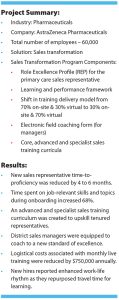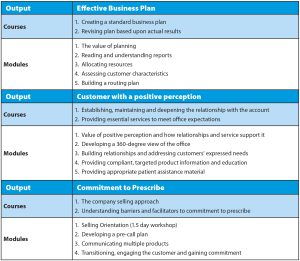
Transformations – by Jaime Torchiana, M.S.
An outcomes based approach led to a sales transformation
 The pharmaceutical industry has faced unprecedented change in recent years, including, but not limited to:
The pharmaceutical industry has faced unprecedented change in recent years, including, but not limited to:
- Changes to the payer environment that restrict a physician’s ability to prescribe prescriptions they deem most beneficial.
- Increased competition from lower-cost, generic alternatives to branded medicines.
- Increased administrative burden and patient load, making it difficult for physicians to spend time with representatives or attend drug information and education sessions.
- Increased regulations shaping the nature of prescriber-representative relationships and how information can be promoted and shared.
- The number of products in the market for a given therapeutic area, making it challenging for representatives to differentiate themselves and their products.
These challenges made it increasingly difficult for sales representatives to engage in meaningful dialogue with their customers on a regular basis. In addition to these changes in the wider landscape, the organization had its own challenges, including:
- Pivoting to a relationship-centric model. Instead of multiple representatives representing different products and all calling on the same physician, the company required a single point of contact to promote multiple products on every call, hindering the ability to adequately educate physicians on any particular product in any depth.
- Restrictions on training investment, which put pressure on the six-week live, headquarter based training.
- The need for a training paradigm that could easily support new product launches and copromoted products.
- Training beyond disease state and product knowledge, to incorporate more business acumen and data-driven insights.
Table 1: Learning and Performance Framework (Core Curriculum)
A Performance-Based Strategy
AstraZeneca’s commercial learning team adopted an outcomes-based approach to this sales transformation and imposed several guiding principles, or tenets, for this work:
- Base training on work context and outcomes produced by the best sales representatives.
- Provide a more flexible (remote) approach to training and onboarding that rebalances the 70% in-person training to 70% virtual modalities.
- Make learning a continuous, on-the-job process that continues well after new hire onboarding.
- Provide a framework that easily supports new product launches.
- Recognize and appeal to the needs of multigenerational learners.
- Equip district sales managers with the tools and resources to coach representatives to the new standard of excellence.
Defining Sales Representative Success
Taking an outcomes-based approach meant beginning with the end in mind. What business results were expected of the sales representatives? Who delivered on these consistently well? Were there any shared attributes or activities among the best sales representatives?
Alignment with the vice president of sales and the vice president of HR, who had just introduced a trait-based personality assessment into the interview process, was critical. Those discussions illuminated the business outcome expected of the representative: to meet and/or exceed sales expectations for their assigned territories.
The stakeholders also shared their future vision for the sales representative role, key performance metrics, qualitative and quantitative measures of success, and a list of the top-performing sales reps in the company to interview and observe.
The next step was to capture what made the best representatives such exemplary performers. Through extensive group framing sessions and one-on-one interviews, a blueprint of their performance, or a role excellence profile (REP), was developed. This model went beyond traditional competencies and capabilities and captured what these representatives “produced” that was of value to the organization, as well as the criteria they believed to be key to producing it well.
A Learning and Performance Framework
While it may be tempting to conclude that the performance work is complete once a profile of the best has been extracted, the key to lasting sales transformation is to leverage the REP as the design point for a curriculum that trains all employees to produce like the best.
A learning and performance framework translates performance outcomes into learning outcomes and objectives that can be taught, sequenced and converted toon-the-job sales aides to raise the levels of an individual’s performance. The three primary REP outputs became the three main courses of the new hire curriculum, and the tasks required to achieve the outputs became the modules within the courses. (See Table 1.)
During this mapping exercise, it was apparent that there were “core” and “advanced” and “specialist” components, which led to the development of a core, advanced and specialist sales training program, accordingly. Understanding discrete lessons and learning objectives also meant that the team could easily identify topics that were best for self-paced, virtual delivery modalities and others, like selling simulations, that were best deployed in a live setting that incorporated immediate performance feedback.
Managers as the Linchpin
The success of any transformational program requires leadership enrollment, endorsement and ongoing engagement. Because expectation setting and performance feedback is critical to skill acquisition and improvement, managers were equipped with an electronic version of the field coaching form to accompany them on their days spent in territory observing and coaching their representatives.
The paper-based form that once assessed selling skills (call opening, product discussion, handling customer objections, delivery of key safety information, safe driving, etc.) was now more comprehensive and aligned to the new standards of excellence. Now available digitally, the revised form had the ability to link back to relevant assets in the curriculum, providing the representatives with targeted support for their ongoing growth and development.
To further ensure the adoption of the REP as the new standard of performance, its elements were also incorporated into new representative job descriptions and interview guides, thus linking every element of the representative’s lifecycle – recruiting, hiring, onboarding, training, coaching and performance management.
Client Impact
As mentioned in the summary:
- By aligning the learning and performance framework to the REP, the percentage of time spent onboarding only those skills necessary for success in the role was increased by 68%.
- Similarly, it was reported that new hires were both confident and more competent because of the new curriculum, hitting proficiency targets four to six months faster than before the training redesign, which was a metric also confirmed by managers.
- The commercial learning department could now offer “advanced” and “specialist” sales training as a means for tenured and hospital-based sales representatives to continue to develop their skills.
- Sales managers were able to align on consistent expectations for the role and were better equipped to coach and manage their representatives’ performance according to the new performance standard.
- The learning and performance framework presented a learning paradigm that easily incorporated new product launches and acquisitions.
- Logistical costs (e.g., travel, hotel, meals, live classroom material production, etc.) associated with six congruent weeks of live, in-person training were reduced by $750,000 per year.
- Work-life rhythm for new hires was improved as they were able to repurpose travel time for learning and job shadowing opportunities in their respective territories.
Conclusion
True and lasting sales transformation requires organization-wide socialization, support and ongoing stakeholder management. When the blueprint of performance is incorporated into every facet of the role, from onboarding to career advancement, the result is an organization that can accelerate the role’s individual and collective performance and business impact.
 Jaime Torchiana, M.S., is president of Exemplary Performance. Email her at jaime.torchiana@exemplaryperformance.com.
Jaime Torchiana, M.S., is president of Exemplary Performance. Email her at jaime.torchiana@exemplaryperformance.com.









